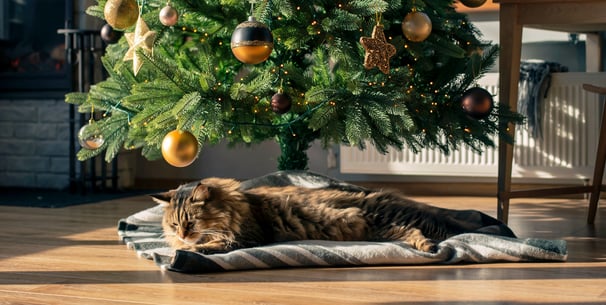
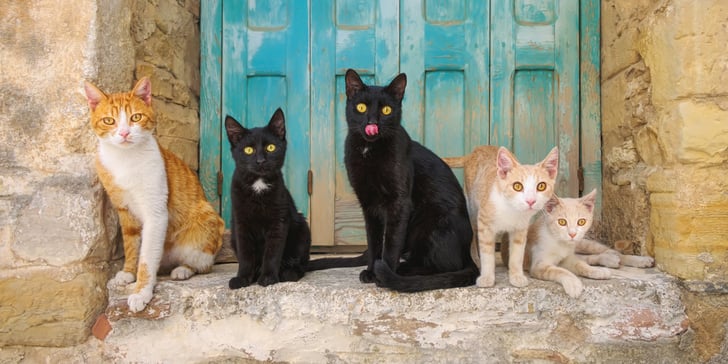

For many young girls of the 2000s, ‘Mamma Mia!’ (2008) was (and still is) our comfort film. The sunny beaches and blue skies of Grecian islands were envied by those of us who grew up in the rainy UK with dreams that we’d one day be singing and dancing to ‘Honey, Honey’ (whilst reading our mum’s diary and trying to figure out who our biological father is, of course).
Whilst I may not have had the string of romantic flings ‘Mamma Mia!’ promised, I did fall in love…just with Greek cats. If you’ve ever been to Greece, there’s a high chance you’ve encountered a feline friend or two and possibly wondered if they have homes just like your pets and what kind of lives they live.
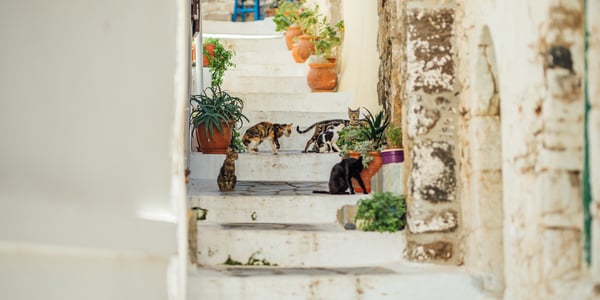


It had taken me to the age of (nearly) 27 before I set foot in Greece for the first time, and whilst I wasn’t on the fictional island of Kalokairi, I was in Hydra, where each day I was falling more and more in love with the hundreds of cats that call the island home. Roaming under tables, jumping on my lap, and making biscuits on my legs, I was in cat heaven and didn’t want to come home.
Accompanied by a book written by Rhiannon Lucy Cosslett titled ‘The Year of the Cat’, I was thinking a lot about our feline friends and the relationships they play in our lives, asking myself questions like, do other people feel such an intense connection to cats? And why do I love animals so much (arguably more than people)? I was also interested in learning more about the island cats. Where do they live? What do they eat? Are they neutered? Do people own them? Can you adopt them? I feel passionate about rehoming and rescuing animals, to the point where even on holidays, I can’t ‘clock off’ from it. I suppose you could say it’s always on my mind. Each time I stopped to stroke a cat, it was like seeing one for the first time. I’m not sure if it was the Grecian sun or the amount of olives and feta I consumed whilst I was there, but I felt giddy, and the dopamine from seeing so many cats was flooding my brain, making the trip one I now want to take at least once a year.


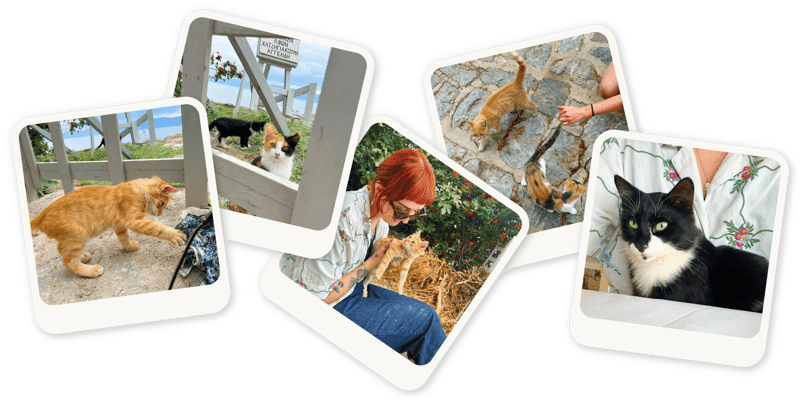
Upon my return home, I felt that my curiosity was not satisfied. I set out to learn more about the rescue organisation on the island that cares for cats and other animals. I noticed that most of the felines residing in Hydra had one of their ears slightly clipped. I assumed this would be because they’d been TNR’ed (trapped, neutered and released) to stop mating and subsequent unwanted pregnancies. This assumption was correct, to my relief. The main rescue organisation in Hydra is called HydraArk, and they’re an entirely volunteer-run non-profit that organises neutering and provides veterinary care to sick or injured cats by taking them to the mainland or arranging for vets to travel to the island.
For many years, their volunteers have worked tirelessly to improve the well-being of animals in Hydra, including cats, dogs and donkeys. These volunteers work all year round to ensure the health of these animals, and it shows. Whilst I was excited to visit Hydra for its beauty and, of course, cats, I was unsure what kind of health profile the cats would have, whether they were well cared for, and whether there was a rescue organisation able to help them. Fortunately, HydraArk works ceaselessly to achieve their goals of TNR’ing, making sure animals are vaccinated and that treatment plans are drawn up for cats with illnesses such as feline leukaemia and FIV. One of their main goals is to establish supervised cat colonies so that they can continue to feed, monitor and look after all of Hydra’s cats and make sure no one is left behind.
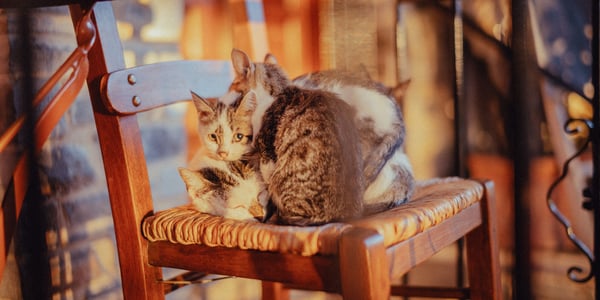


I reached out directly to HydraArk to learn more about the work they do. Jennifer, secretary for the organisation, told me,
“HydraArk was founded out of a deep love for the animals of Hydra, especially the many cats who live among the island’s alleys, harbours, and hillsides.
While they are a beloved part of the island’s charm, many face hunger, illness, and injury without help. Our mission is to care for these cats through feeding, sterilisation, and medical treatment, and to promote responsible animal care in the community. To us, rescuing means dignity; giving each cat a chance at a healthier, safer life, and building a future where no animal is left behind.
Since 2007, our small but passionate group of volunteers has poured heart and energy into making life better for Hydra’s animals. Those of us who live here keep watch over the cats all year long—feeding them daily, keeping an eye on their well-being, and stepping in or finding help whenever they need medical care.
None of this would be possible without the kindness and generosity of visitors who love animals as much as we do. Our greatest joy comes when returning friends tell us that where they once saw blind, starving, and sickly cats struggling to survive, they now see bright-eyed, healthy, confident animals thriving across the island.”
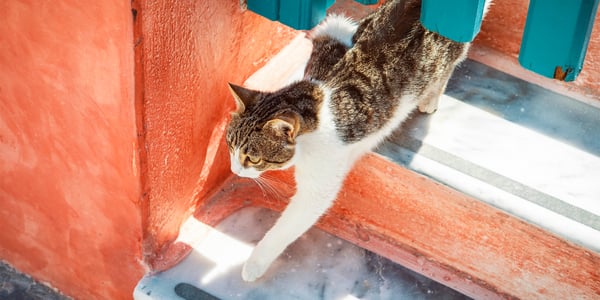


Something I found heartwarming is that HydraArk encourage visitors of the island to adopt cats. They help to provide all the information you need, including lists of documents and equipment you’ll need to transport a cat overseas. You can also volunteer for the day, sponsor a cat’s accommodation, accompany them on flights, or even drop off supplies at one of their many donation stations dotted around the island.
One of the many reasons I found Hydra so charming (besides the physical beauty of the island) was the temperament of the cats and the relationship the residents share with them. Most of the cats I encountered simply wanted petting, love and attention. They weren’t fighting, and they weren’t trying to steal food from my plate either (though maybe this is because I’m vegetarian, but we’ll ignore that). I suppose what I’m trying to say is that the cats I met weren’t desperately trying to get their needs fulfilled because the rescue organisation and the people of Hydra do an amazing job of that already. Though of course, this places a huge pressure on the organisation to have the facilities to do so, and this can’t be achieved without help.
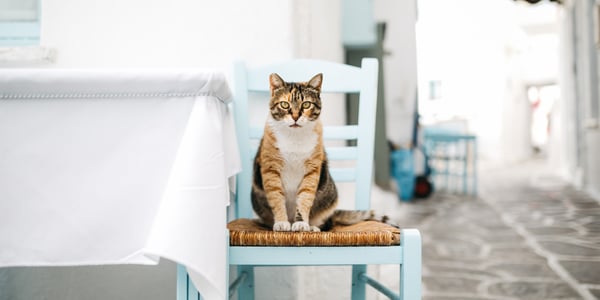


Though HydraArk do an amazing job of looking after animals, they cannot do it alone. One night during dinner, I spoke to a local and asked him how fellow Hydriots feel about the cats, whether they’re accepted and loved or considered more of a nuisance. He told me, “They’re looked after like everyone’s pets.” This sentiment filled me with joy and an acknowledgement that it’s not just the crazy cat lady in me that goes wild for cats, but that this celebration of feline life exists in others and that here, on a tiny island off mainland Greece, there’s a general sense of appreciation for cats and a love of animals that extends widely across the island.
Walk through the port and you’ll notice little ceramic bowls filled with water and kibble outside of shops and doorways. You’ll see cats sitting on boats trying to push their luck at securing a fish, cats on the chairs of restaurants, cats on balconies, and cats just generally, everywhere. Upon leaving the island, I felt hopeful. Hopeful that in a world often dictated by greed and selfishness, community still exists and is thriving.
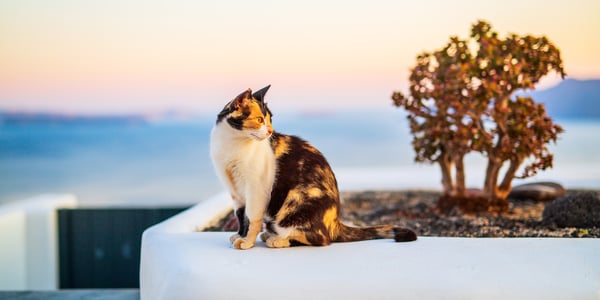


HydraArk still need help, and when I return in the future, I guarantee I’ll be spending my time on the island volunteering. If you’re interested in finding out more about the work they do, take a look at their website, where you can find links to donate.
In the meantime, if you’re considering heading to Greece or are unsure of your next travel destination, I couldn’t recommend Hydra more. Even if you’re not fully cat-crazy, are yet to be convinced, or you’re looking for a more non-conventional way to adopt a pet, there’s a reason Leonard Cohen fell in love with the island in the 1960s - I think I found it, and I think you can too.
Waggel Pet Insurance
Need more help? You're in luck if you're a Waggel Pet Insurance member. Along with our excellent coverage, we offer access to a 24/7 online vet to answer all your sticky questions, especially if you need grooming assistance.
Not a member? Why not get a quote now and cover your furry friend for a range of illnesses, all while enjoying our amazing perks and rewards.
Want more like this?
Get updates from us with helpful info, advice, answers to frequently asked questions and much more.
Related posts:
Get your quote
Along with our excellent coverage, we offer access to a 24/7 online vet to answer all your sticky questions.



